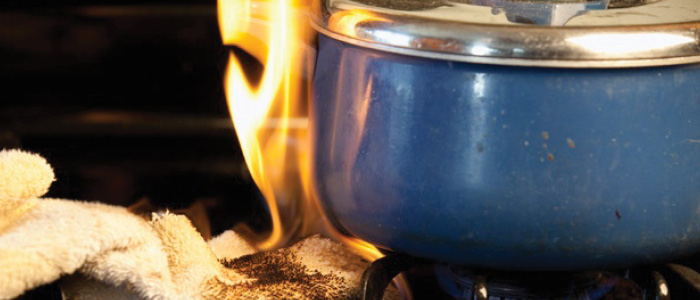By Mike Michael, Lititz Fire Company
It’s Fire Prevention Week, commemorating the Great Chicago Fire that began on October 8, 1871 and caused devastating damage. This horrific conflagration killed more than 250 people, left 100,000 people homeless, destroyed more than 17,400 structures, and burned more than 2,000 acres of land.
Fire Prevention Week History
Since 1922, The National Fire Protection Association (NFPA) has sponsored the public observance of Fire Prevention Week. In 1925, President Calvin Coolidge proclaimed Fire Prevention Week a national observance, making it the longest running public health observance in our country. During Fire Prevention Week, children, adults and teachers learn how to stay safe in case of a fire. Firefighters provide lifesaving public education in an effort to drastically decrease casualties caused by fires.
“Serve Up Fire Safety in the Kitchen” – 2020 Theme for Fire Prevention Week
Cooking is the #1 cause of home fires and related injuries, and unattended cooking is the primary cause of fires in the kitchen. With the holidays approaching, it’s important to know that Thanksgiving is the leading day for fires involving cooking equipment. Follow these helpful hints to stay safe in the kitchen:
- Never leave the kitchen when boiling, broiling or frying food.
- If you are simmering, baking or roasting food, check it regularly and stay inside the home.
- Always keep a lid nearby when cooking. If a small grease fire starts, slide the lid over the pan and turn off the burner.
- Turn off the stove when finished cooking.
- Keep combustibles away from the stove. Towels and oven mitts often start fires.
- A common cause of fires is pizza boxes left on top of stoves…dogs jump on stoves to investigate and turn the stove dial on.
Fire Escape Plan – Be Prepared!
- Newer homes burn faster than older homes. It is imperative that you exit the home quickly in the event of a fire.
- Draw a map of all rooms in your home.
- Mark 2 exits from each room (usually a door and a window). Mark a path from each exit to the outside.
- Include the location of all alarms in your house.
- Choose an outside meeting place to meet up.
- Call 911 from outside the house.
- Practice twice a year.
Smoke Alarms – Providing a Life-Saving First Alert!
- Smoke alarms detect and alert people to a fire in the early stages.
- Smoke alarms can mean the difference between life and death in a fire.
- Working smoke alarms cut the risk of dying in a home fire in half.
- Install smoke alarms in every sleeping room, outside each separate sleeping area, and on every level of the home, including the basement.
- Test smoke alarms at least once a month using the test button.
- Make sure everyone in the home understands the sound of the smoke alarm and knows how to respond.
- Smoke alarms need to be REPLACED at least every 10 years.
For more information on keeping yourself safe from fire in your kitchen and home, visit www.firepreventionweek.org and our very own local heroes at www.lititzfire.org.
Q&A with Gary Gaissert, Moravian Manor Communities, VP of Operations
Q: What training is done at Moravian Manor Communities with regards to fire and emergencies?
A: All Life Plan Communities are mandated to have an emergency preparedness plan in place that includes processes and procedures for both residents and staff. Here at Moravian Manor Communities (MMC), we focus on staff training and responses to all types of emergencies including fire. MMC staff are well trained to respond promptly and effectively to any emergency situation to provide essential services to protect the people and property under its care. We utilize the Incident Management System, which clearly identifies staff responsibilities and assignments enabling us to interact and communicate with the operations of all outside support agencies (fire/police/ems/etc.). Every staff member is required to be recertified annually in the proper use of a fire extinguisher. (Incidentally, we have partnered with Warwick Emergency Services Commission in helping fund the purchase of extinguisher training equipment.) Throughout the year, there are multiple practice drills in all levels of care. We regularly check/test all emergency notification and sprinkler systems to ensure they are in proper working order. In addition, our staff interacts with the local fire and emergency management staff to continually update our response plans. Stay safe!

